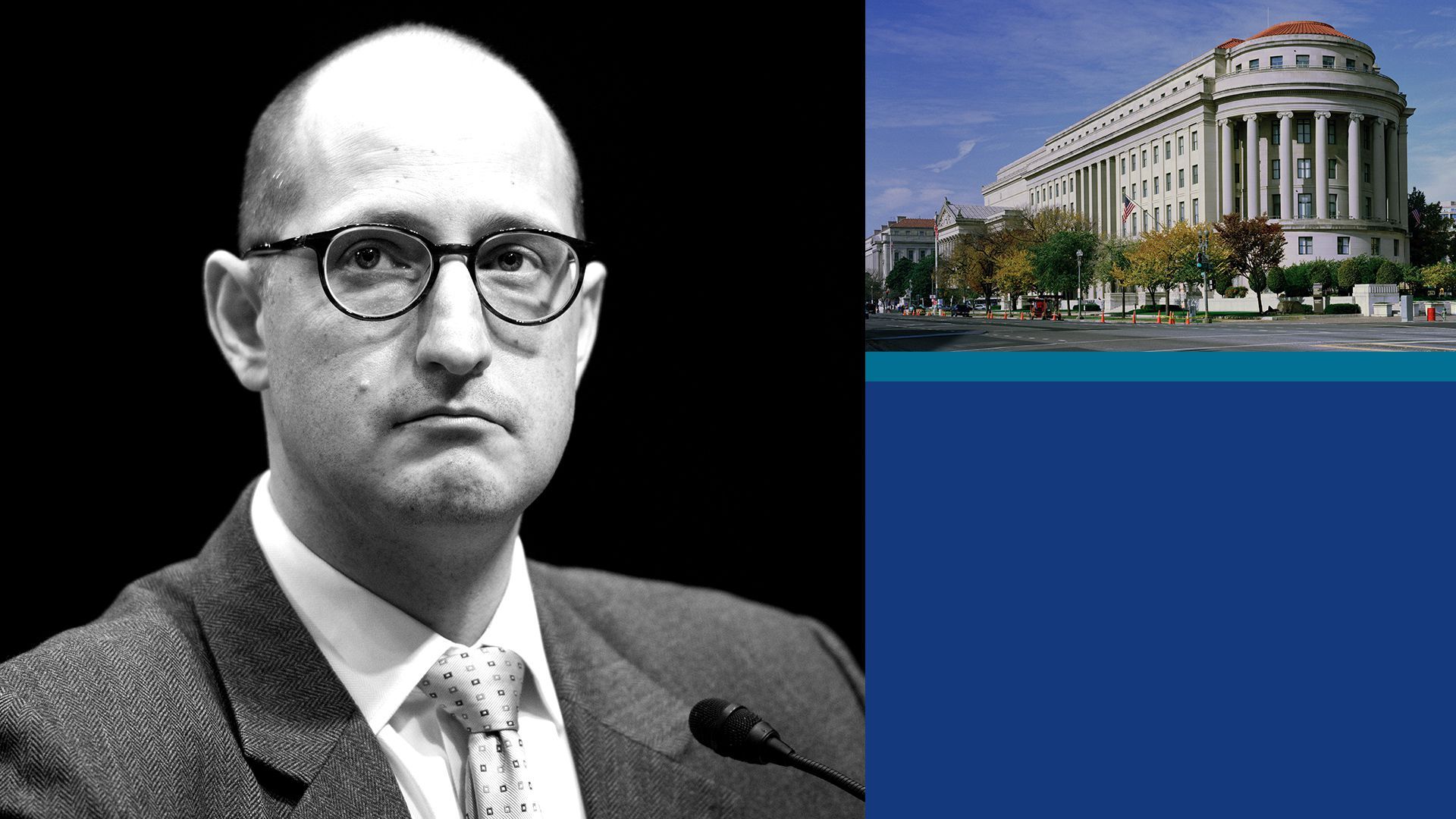September 18, 2020
Situational awareness: New downloads of the TikTok and WeChat apps will be banned Sunday in the U.S., Secretary of Commerce Wilbur Ross declared in a statement this morning.
- Our thought bubble: Existing U.S. TikTok users should be able to keep TikTokking. But the move, which was legally required by a Trump executive order, could be either a sign of administration disapproval of the proposed Oracle-TikTok deal (see below) or a final negotiating ploy.
Today's Login is 1,595 words, a 6-minute read.
1 big thing: How the Oracle-TikTok deal would work

Illustration: Aïda Amer/Axios
An agreement between TikTok's Chinese owner ByteDance and Oracle includes a variety of concessions in an effort to make the deal palatable to the Trump administration and security hawks in Congress, a source close to the companies told Axios.
The big picture: The deal, in the form of a 20-page term sheet, agreed to in principle by the companies, would give Oracle unprecedented access and control over user data as well as other measures designed to ensure that Americans' data is protected, according to the source.
Why it matters: The President and U.S. leaders have been calling for a complete sale of the business. While this isn't that, it does create several layers of oversight, including a continuous third-party audit and an independent board approved by the U.S. government.
Details: Among the provisions of the term sheet, per the source:
- Oracle will have the exclusive ability to oversee all tech operations for TikTok in the U.S.
- Oracle will review TikTok's source code and related software to ensure there are no backdoors.
- Oracle will also be able to review all updates to TikTok's software to ensure no adverse changes are made.
TikTok in the U.S. will have its own board, approved by the U.S. government.
- That board will include a security director — an independent data security expert with national security credentials, so likely a former NSA or CIA official with a high-level security clearance.
- There will also be a security subcommittee of the board composed of U.S. citizens with the final say on matters related to security and data privacy. It will have veto power over board decisions that go against the company's security commitments.
- That subcommittee will also be responsible for ensuring compliance with CFIUS and other U.S. agency demands.
A separate entity, TikTok Global, will have its own board and be based in the U.S. It’s that entity in which Oracle, as well as Walmart, will have an ownership stake.
The intrigue: TikTok is going to make the case that American investors will own the majority of TikTok Global.
- But that's only by combining the minority stake U.S. investors own in ByteDance with the stake Walmart and Oracle would have in TikTok Global.
- Yes, but: That's not the same as U.S. investors having a controlling stake.
Between the lines: While the deal does not constitute a full sale and likely leaves a substantial chunk of the company in Chinese hands, the source notes that these security provisions represent way more than any other tech company is doing or being asked to do.
My thought bubble: The Trump administration has pushed U.S. companies to take a bigger financial interest in a reorganized TikTok as part of securing U.S. data.
- But since Oracle is the party charged with assuring that TikTok isn't misusing data, the whole arrangement might be cleaner if Oracle didn't have a stake in the business.
- As co-owner, it could have a conflict of interest in seeking to protect U.S. security and the company's value at the same time.
What's next: The deal, which comes amid a broader dispute between the Chinese and U.S. governments, still needs approval from both countries to proceed. As recently as Thursday, President Trump was expressing doubt about a deal that would leave ByteDance with a significant financial stake in TikTok.
2. Exclusive: Coronavirus lockdowns giving smart speakers a workout
More Americans own a smart speaker than ever before and the devices are also seeing an increase in usage, according to a survey from Adobe, results of which were shared first with Axios.
Why it matters: Smart speakers and displays not only represent a new frontier for computing, but also could shift the balance of power in search and advertising, as Google faces tough competition from category pioneer Amazon.
By the numbers:
- 39% of respondents said they own a smart speaker, up from 36% in February 2019 and 28% in January 2018.
- Among those who do own a smart speaker, 46% said that they used the devices' voice assistants more often during the three-month period from April through July than they had previously.
- Listening to music remains the most popular use (reported by 60% of survey respondents), followed by asking about the weather (55%), "asking fun questions" (46%) and searches (45%).
- Roughly 39% of people said they used their smart speakers for each of the following: basic information queries, checking the news, and setting reminders or alarms.
Between the lines: We still don't know how quickly smart speakers will take off as an advertising platform, or how effective such ads are.
To that end, Adobe said that 51% of those surveyed said they have heard an ad on their speaker, double the number that said so in May 2019. Of those who are hearing ads, 85% said they hear them at least weekly.
- 58% of consumers find smart speaker ads to be less intrusive than other major formats (TV, print, online, social). That's up from 43% in May 2019.
- Similar majorities say they find speaker ads more engaging and more relevant to their needs and interests.
- 53% reported that a smart speaker ad eventually drove them to make a purchase, up from 39% in May 2019.
3. Exclusive: Dreamscape, ASU partner to bring classes into VR

Image: Dreamscape
Arizona State University, which has been at the forefront of the shift to online learning, is partnering with VR startup Dreamscape to help make its classes more cinematic in both approach and storytelling.
The big picture: Shifting in-person classes online too often feels like a "less than" experience. The partners hope that a more ambitious digital transformation of teaching can actually improve on the traditional classroom.
Details:
- The Dreamscape Learn modules will be able to be experienced via a full-body VR suit, wearing just a headset, or even on a traditional two-dimensional display.
- The first will teach biology, using real concepts applied to a fictional alien universe, using avatar-based VR.
- ASU is devoting 150 employees and millions of dollars to build a VR lab.
- ASU and Dreamscape will jointly own the work, which they aim to offer to other schools and, potentially, direct to students. ASU is also taking an ownership stake in Dreamscape.
Between the lines: Dreamscape started in the location-based VR business, putting attractions in malls, but that business has dried up during the pandemic.
- Unlike Spaces, which pivoted away from in-person VR attractions before being sold to Apple, Dreamscape is hoping for that business to return.
- "The whole issue of in-person entertainment is very much in flux," Dreamscape CEO Walter Parkes told Axios. "I believe it will come back."
ASU, meanwhile, sees the Dreamscape partnership as the next step in a longer-term push to use technology to fundamentally change learning.
- Arizona State has 75,000 in-person college students and another 75,000 seeking degrees online and has spent millions of dollars to create an interactive online curriculum, including adaptive classes that proceed at students' own pace.
- "We’re very much of the view the public university model has not continued to evolve to a path of success," President Michael Crow told Axios. "We’re an exception to that."
What's next: Between now and March, Dreamscape and ASU aim to develop and test the first modules so they can be used in class next fall.
4. FTC commissioner on privacy, antitrust and more

Photo illustration: Aïda Amer/Axios. Getty Images photo: Tom Williams/CQ Roll Call
Republican member of the Federal Trade Commission Noah Phillips intends to stay at the agency through the end of his term, which is up in about three years, and has not yet decided what happens after, he told Axios' Ashley Gold during a taping of C-SPAN's "The Communicators" this week.
Why it matters: Phillips is one of three Republicans serving on the five-member agency, along with Chairman Joe Simons and Republican commissioner Christine Wilson. Their perspective holds sway at an agency that is pursuing big tech more aggressively than in the past but still moves meticulously when bringing antitrust cases.
What Phillips said:
Privacy: The U.S. needs a federal standard, Phillips says, and it's OK that it's taking a while for that to happen.
- "This can be gotten wrong," he said, alluding to reports that GDPR in Europe is entrenching the biggest firms.
- Meanwhile, leading Republicans on the Senate Commerce Committee introduced privacy legislation Thursday.
The future of independent agencies in the age of Trump: After the administration pulled FCC commissioner Mike O'Rielly's renomination, likely due to his comments on President Trumps' social media executive order, does Phillips worry about his agency's independence? "Fundamentally, no," he said. "We have a protection against being fired... at the end of the day, it's the five commissioners who make the decisions."
Antitrust law is for consumers, not competitors: Phillips said he thinks people are putting too much into the "vessel" of antitrust.
- "I've seen everything from 'democracy would be restored,' to racial justice, the environment...these are important policy questions, but it's not clear at all to me that antitrust was designed to solve these problems," he said.
On reports that President Trump may be trying to line up a replacement for FTC Chairman Joe Simons:
- "I have certainly seen nothing that suggests that Chairman Simons is leaving because the president wants him to," Phillips said.
5. Take Note
On Tap
- Shares of game-engine maker Unity are expected to begin trading on Friday, with its more than 3,300 employees across 17 countries able to take part in a virtual ringing of the NYSE bell. Unity priced 25 million shares at $52 apiece, becoming the second $1 billion software IPO of the week.
- TechCrunch Disrupt wraps up online.
Trading Places
- Twitter has made several new hires in its D.C. public policy office. Amy Murphy is coming over from the Internet Association and will focus on privacy. Todd O'Boyle is joining from Lime and will focus on elections, census, violent extremism immigration. And Wifredo "Wifi" Fernandez, who joins from Cyber Civil Rights Initiative, will work on federal and state advocacy efforts. Also, Lauren Culbertson has been promoted and will serve as the head of U.S. public policy.
ICYMI
- Twitter added new security measures to protect high-profile political accounts ahead of the 2020 election. (Axios)
- California's attorney general announced a settlement with fertility app Glow over allegations of privacy violations. The fertility app will pay a $250,000 fine and agree to follow data protection laws.
- The co-founder of the cyber-fraud detection firm NS8 was arrested on charges of securities fraud. (CyberScoop)
- IBM launches "autonomous Mayflower" research ship on 400th anniversary of the original voyage. (TechRepublic)
6. After you Login
The National Archives has an online tool that lets people add their own signature to virtual copies of the Declaration of Independence and the U.S. Constitution. Yesterday marked the 233rd anniversary of the Constitution's signing on Sept. 17, 1787.